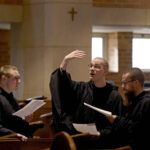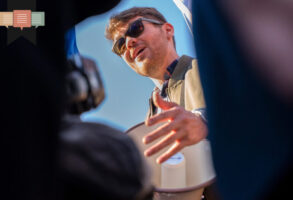
Published October 6, 2023
Thoughts on “Conversations in the Spirit”
The name of the methodology being used in Synod-2023’s small-group discussions, “Conversations in the Spirit,” prompts some thoughts on what listening to the Holy Spirit involves—and doesn’t.
Bishop William F. Murphy, emeritus bishop of Rockville Centre, New York, spent a considerable amount of time this past summer reading Yves Congar’s massive work, I Believe in the Holy Spirit; there, he found a wealth of useful material that he summarized in a memorandum he shared with me. Yves Congar, O.P., was one of the most influential theologians at the Second Vatican Council and was named cardinal by John Paul II in 1995; the French Dominican’s understanding of how to assess what may (or may not) be genuine gifts of the Holy Spirit is especially relevant at this moment in Catholic history, and amidst this “synodal process.”
That the Holy Spirit does in fact offer particular gifts to individuals—including gifts of insight—is not in doubt. The question is, how does the Church discern the difference between a genuine gift of the Holy Spirit and a misconception (or worse)? This is not a new challenge for the Church; it is in fact quite ancient, as we learn from 1 Thessalonians 5:18–20: “Do not quench the Spirit, do not despise prophesying, but test everything.” That Pauline injunction, as interpreted by Congar and reported by Bishop Murphy, involves a judgment based on three criteria.
First, does what is thought to be a gift of the Holy Spirit build up discipleship in the community? Second, can the community understand this gift as Spirit-given? Third, does the recipient accept it as an expression of supernatural love, not as a personal privilege?
In short, gifts of the Holy Spirit, which include those gifts of insight by which the Church deepens its self-understanding and thus enhances its mission, are not simply claimed or announced or proposed; they are “discerned” to be such by the Church. Which means that any such gifts must be consonant with divine revelation and the tradition of the Church.
As Professor Hans Boersma noted in “LETTERS FROM THE SYNOD-2023: #2,” traditio—the Church’s tradition, its “handing on” of the truths by which it lives—begins within the Holy Trinity: The Father hands everything over to the Son, who, through his gift of the Holy Spirit, empowers the Church as his Mystical Body to continue that “handing on” in the world over time. Thus in his First Letter to the Corinthians, St. Paul writes that he was given the kerygma—the basic Christian proclamation of the lordship of Christ, raised from the dead—before handing it on to others: “For I delivered to you as of first importance what I also received . . .” (1 Cor. 15:3, emphasis added). The Church’s tradition, then, is grounded in divine revelation: the truths given us by which we measure all authentic development of doctrine.
Which suggests three lessons for Synod-2023’s “Conversations in the Spirit.”
First, the Holy Spirit cannot teach the Church as true today what the Spirit once taught the Church as false.
That is, the Holy Spirit, having once taught the Church that X makes for righteous living, happiness, and eternal beatitude and Y does not, will not and cannot teach that Y is now a source of grace. This should be self-evident; if God does not repent of, or renege on, his gifts and promises (Rom. 11:29), then neither does the Spirit, the Third Person of the Thrice-Holy God, teach that Y is not good in one historical-cultural moment and good in another. To suggest otherwise is to adopt a quasi-Islamic concept of God as sheer willfulness, which is not the biblical concept of God. In light of present controversies, it must be said that this self-evident truth—that the Holy Spirit never contradicts what the Holy Spirit previously taught the Church as the truth—applies to our being created as men and women, and to the authentic expression of human love (Gen. 1:27–28).
Second, discernment of the authentic promptings of the Holy Spirit is a matter of ideas as well as feelings, for God created us with brains as well as hearts.
The discussion-methodology of “Conversations in the Spirit” relies heavily on the solicitation of feelings, as facilitators ask: “How did you feel when A said ‘B’?” and “How do you feel about that?” Now there is surely a place for feelings in a genuinely ecclesial process of discernment. (An interesting myth—or perhaps true story—from synodal history involves Bishop Nicholas of Myra expressing his feelings at the First Council of Nicaea via the application of his fist to the jaw of Arius, the Cyrenaic theologian and heresiarch.) But the Holy Spirit does not speak through feelings alone, and the constant appeal to feelings in any discussion is usually a means for dodging hard but necessary arguments and debate. And debate is the normal means by which the Church discerns an authentic development of her self-understanding from a spurious one: or, to put it more bluntly, doctrinal truth from heresy. Populist anti-intellectualism is no aid to a discernment of what the Holy Spirit is saying to the Church today.
Third, authentic “Conversations in the Spirit” must reckon with the fact that the Holy Spirit is a polyglot.
“Communion, participation, and mission” (the subthemes of this Synod on Synodality) began two thousand years ago, when the Holy Spirit spoke in such a way that the basic Christian kerygma—“Jesus is Lord”—was heard by Parthians, Medes, Elamites, residents of Mesopotamia, Judaea and Cappadocia, Pontus and Asia, Phrygia and Pamphylia, Egypt and Libyan Cyrene, as well as Romans, Cretans, and Arabians (Acts 2:9–11). Yet in the documentation produced in preparation for the Synod, the Holy Spirit seemed to have become monolingual, speaking only to the concerns, and in the vocabulary, of North Atlantic progressive Catholicism—and with a certain Teutonic accent at that. Isn’t there something here of the neo-colonialism against which Pope Francis has inveighed many times?
Authentic discernment through “Conversations in the Spirit” must therefore reckon with the biblical witness that the Holy Spirit is not a monoglot. Today, as in Jerusalem two millennia ago, the Holy Spirit is a polyglot.
One other biblical image sheds light on “Conversations in the Spirit.”
When the Spirit descended on the apostles and Mary in the Upper Room, as recorded in the aforementioned second chapter of the Acts of the Apostles, those who had been touched by tongues of fire did not sit around marveling at what a nifty experience that was, and discussing whether they might experience it again. No, they left the shuttered and locked room of their fears and went out boldly in mission. Here is a biblical paradigm for the Church in all ages and in every culture.
In his address to the General Congregations of Cardinals before the conclave of 2013, Cardinal Jorge Mario Bergoglio, S.J., who had helped call the Latin American Church into mission through his work on the 2007 Aparecida Document on the New Evangelization, made a powerful impression by warning his brother-cardinals about the dangers of the Church becoming self-referential—a warning he has repeated as Pope Francis for more than a decade. Yet the “synodal process” up to now has often been a long march through the Bogs of Self-Referentiality: a slog that seemed to continue in the first “Conversations in the Spirit” yesterday. If those conversations are authentically Spirit-led and Spirit-inspired, they will quickly turn to issues of mission in a world that needs a Catholicism that speaks confidently and with compassion about Jesus Christ as the revelation of the truth about God and about us.
So as the synodal “Conversations in the Spirit” unfold this month, it would perhaps be helpful if the entire Church prayed daily the great Sequence for Pentecost Sunday, the Veni Sancte Spiritus, here in its classic English translation by John Mason Neale:
Come, Thou Holy Paraclete,
And from Thy Celestial seat,
Send Thy light and brilliancy:
Father of the poor, draw near,
Giver of all gifts, be here:
Come, the soul’s true radiancy:
Come, of Comforters the best,
Of the soul the sweetest guest—
Come, in toil refreshingly:
Thou in labor rest most sweet,
Thou art shadow from the heat,
Comfort in adversity.
O thou Light, most pure and blest,
Shine within the inmost breast
Of thy faithful company.
Where Thou art not, man hath nought;
Ev’ry holy deed and thought
Comes from Thy Divinity.
What is soiled, make thou pure;
What is wounded, work its cure;
What is parched, fructify;
What is rigid, gently bind;
What is frozen, warmly tend;
Strengthen what goes erringly.
Fill Thy Faithful, who confide
In Thy pow’r to guard and guide,
With Thy sev’nfold Mystery:
Here Thy grace and virtue send;
Grant Salvation in the end.
And in Heav’n felicity.
Amen. Alleluia.
(The traditional Gregorian chant setting of the Sequence may be found here. A fine contemporary setting of the Veni Sancte Spiritus by the American composer Morten Lauridsen may be found here.)
George Weigel
Reflections on the Synod from Nigeria
Fr. Anthony Akinwale, O.P., is a distinguished Dominican scholar, recently awarded the title Magister in Sacra Theologia (“Master of Theology”) by his Order. He currently serves as Professor of Systematic Theology and Thomistic Philosophy at the Dominican University in Ibadan, Oyo State, Nigeria. LETTERS FROM THE SYNOD-2023 is grateful to Fr. Akinwale for providing the following text, which speaks directly to the question of the development of doctrine in an authentic discernment while clarifying certain confusions about Pope John XXIII’s intentions for Vatican II.
Xavier Rynne II
On October 11, 1962, at the opening of the Second Vatican Council, Pope St. John XXIII said:
The major interest of the Ecumenical Council is this: that the sacred heritage of Christian truth be safeguarded and expounded with greater efficacy. That doctrine embraces the whole man, body and soul. It bids us live as pilgrims here on earth, as we journey towards our heavenly homeland. . . . If this doctrine is to make its impact on the various spheres of human activity—in private, family, and social life—then it is absolutely vital that the Church shall never for an instant lose sight of that sacred patrimony of truth inherited from the Fathers.
But it is equally necessary for her to keep up to date with the changing conditions of this modern world, and of modern living. . . . This . . . Council . . . is to give to the world the whole of that doctrine which, notwithstanding every difficulty and contradiction, has become the common heritage of mankind—to transmit it in all its purity, undiluted, undistorted. . . . And our duty is not just to guard this treasure, as though it were some museum-piece and we the curators, but earnestly and fearlessly to dedicate ourselves to the work that needs to be done in this modern age of ours, pursuing the path which the Church has followed for almost twenty centuries . . .
What is needed is that this certain and immutable doctrine, to which the faithful owe obedience, be studied afresh and reformulated in contemporary terms. For this deposit of faith, or truths which are contained in our time-honored teaching is one thing; the manner in which these truths are set forth (with their meaning preserved intact) is something else . . .
In these days . . . it is more obvious than ever before that the Lord’s truth is indeed eternal. Human ideologies change. Successive generations give rise to varying errors, and these often vanish as quickly as they came. . . . The Church has always opposed these errors, and often condemned them with the utmost severity. Today, however, Christ’s Bride prefers the balm of mercy to the arm of severity. She believes that present needs are best served by explaining more fully the purport of her doctrines, rather than by publishing condemnations. . . . The great desire, therefore, of the Catholic Church . . . is to show herself to the world as the loving mother of all mankind; gentle, patient, and full of tenderness and sympathy for her separated children . . .
She unseals the fountains of her life-giving doctrine, so that men, illumined by the light of Christ, will understand their true nature and dignity and purpose. Everywhere, through her children, she extends the frontiers of Christian love, the most powerful means of eradicating the seeds of discord, the most effective means of promoting concord, peace with justice, and universal brotherhood.
In these words of Pope St. John XXIII, one finds an echo of St. John Henry Newman’s theory of the development of doctrine. This theory stands on two feet, namely, permanence and immutability of doctrine, and new ways of understanding, interpreting, and formulating immutable doctrine. At the same time, Newman foresaw the possibility of misunderstanding, misinterpretation, and erroneous reformulation of immutable doctrine. For this reason, he drew a contrast between genuine developments and corruptions of doctrine. In order to grasp this differentiation, he presents seven notes or characteristics of a genuine development of doctrine, the first of which is what he calls “preservation of its type.”
Explaining this first note of a genuine development, Newman wrote:
This is readily suggested by the analogy of physical growth, which is such that the parts and proportions of the developed form, however altered, correspond to those which belong to its rudiments. The adult animal has the same make, as it had on its birth; young birds do not grow into fishes, nor does the child degenerate into the brute, wild or domestic, of which he is by inheritance lord. (An Essay on the Development of Christian Doctrine, ch. 5, section 1.1)
It has been said over and over again that this Synod is not out to change doctrine. At the same time, it needs to be said that whatever is said or proposed at this Synod must meet this requirement of preservation of type. Pastoral dispositions and actions must not be seen as out of sync with doctrine. We cannot rely on Newman without the Vincentian Canon on which Newman himself relied.
Synodality must not walk away from apostolic doctrine. It obliges us to walk within apostolic tradition. It was to keep us away from walking together but away from apostolic tradition that Vincent of Lérins put forward his famous Canon that revealed [that] apostolic doctrine is “quod semper, quod ubique, quod ab omnibus.” Revealed doctrine is what has been held always, everywhere, and by all. In treating each of the so-called hot-button issues of this Synod, the bottom-line question is: Does it fit into the description of what has been held as apostolic doctrine always, everywhere, and by all? The answer can only be “yes” or “no.” These are questions that demand clear answers.
Pastors are teachers of apostolic doctrine, not teachers of doctrines they have invented, nor proponents or spokespersons of ideologies at odds with apostolic doctrine. Their exercise of pastoral office involves receiving, preserving, and transmitting apostolic doctrine without distorting it. The wisdom of Vincent of Lérins offers an admonition in this regard. He wrote:
Guard this deposit [of faith]. What has been entrusted to you and not what you have invented: a matter not of wit, but of learning; not of private adoption, but of public tradition; what you have received and not what you have thought. You are not the author but the guardian, not a teacher but a learner, not the founder but a follower. Guard this deposit. Preserve the gift of Catholic faith. Keep it from violation or adulteration. What has been entrusted to you keep in your possession and let it be handed on by you. You have received gold, give back gold. Do not substitute one thing for another. . . . Teach that just as it has been taught to you. And while you express yourself in a new way do not utter news things. (Commonitorium, n. 53)
Pope St. John XXIII differentiated between the unchanging matter of doctrine and the changing manner of teaching it. But in the build-up to the Synod on Synodality, voices are being heard of those who want to change both the matter and the manner—or change the matter by changing the manner. It is an attempt to embrace Newman’s theory of development of doctrine while repudiating the Vincentian Canon. The consequence can only be repudiation of both. For there can be no Newman without Vincent, no Vincent without Newman.
This Synod should be journeying together within tradition and not away from tradition. If pastors are teachers, they must not do pastoral work without doctrine, they must not exercise the will without the intellect. We cannot truly love without being truthful in love. It seems a current climate of antipathy to the intellect has engendered an “all are welcome” inclusivism. All are welcome into the Church. But not all who were invited accepted the invitation. Some, like the rich young man, “went away sad” (Matt. 19:22). The imperative of repentance and the invitation to discipleship go hand-in-hand. In fact, if we are to go by the chronology of Mark’s Gospel, the imperative “repent” was spoken by Jesus before the imperative “follow me” (Mark 1:14–17). Discipleship comes with a cost. The Church, like her Lord, must be honest to those who are invited, those she wants to include, by letting them know that discipleship comes with a cost. It is the imperative of evangelical honesty.
We are not the first to see the Church as synodal. The eighth chapter of Vatican II’s Lumen Gentium aptly describes the Church as a “Pilgrim Church,” a Church on a journey to eschatological perfection. In that sense, the Church is synodal. Her synodality is an expression of her nature as communion. As she journeys through history, she must be guided by the Word of God in Scripture and tradition. She must keep in mind the words of the Psalmist: “Your word is a lamp for my feet” (Psalm 119:105). It is a matter of synodality with the Word of God, with its preservation and transmission that preserves the type. That is synodality with the past. We must walk together with those who have interpreted apostolic doctrine before us. Teachers of doctrine must see the Christian tradition as a conversation that has been going on for over two millennia. We must walk with those who began the conversation before we arrived. That is synodality in time.
Apart from synodality in time, there must also be synodality in space. In concrete terms, there must also be synodality with local churches in Africa and in the Global South whose voices have been drowned by the voices of some local churches in the Global North in the build-up to this Synod. Will the south be allowed to speak? Will the north listen to the south? Here again, we have questions that demand “yes” or “no” answers. Unless answers to those questions are positive, synodality runs the risk of being reduced to a slogan.
What I Would Say to the Synod
Charles J. Chaput, O.F.M. Cap., served as Archbishop of Philadelphia from 2011 until his retirement in 2020, having previously served as Archbishop of Denver from 1997 until 2011 and before that as Bishop of Rapid City (1988–1997). A veteran of several Synods, his distinguished service to the Church during his episcopates in South Dakota, Colorado, and Pennsylvania effectively combined dynamic orthodoxy, pastoral charity, and the empowerment of the entire Church for mission. Asked by LETTERS FROM THE SYNOD-2023 what he might say to those in Rome this month, Archbishop Chaput kindly provided these reflections on communion, participation, and mission.
Xavier Rynne II
I’ve been asked to offer these thoughts as if I were addressing you in person. Having served as a Synod delegate three times previously, I respect the need for brevity. Simply put, as delegates you have the privilege and duty, in all of your Synod work, of fidelity; fidelity to Jesus Christ, to the Church, and to the Holy Father—in that order of priority. Fidelity to Jesus Christ implies obedience to his witness and Word. Fidelity to the Church implies heartfelt support for her teaching. Fidelity to the Holy Father implies speaking the truth in love to each other and to him (Eph. 4:11–16), in all of your synodal discussions. For the Christian, there can be no genuine love ungrounded in the truth of God’s Word as recorded in the New Testament and preserved by the Church through time.
This Synod has the admirable subthemes of communion, participation, and mission. Yet every Synod is burdened with procedural flaws and internal pressures toward sometimes unhelpful and predetermined ends. It’s the task of the delegate to remember that the Church belongs to Jesus Christ; she is his Church first and—in the words of St. John XXIII—our “mother and teacher.” We are her children, not her architects. In such light, “communion” is not a matter of shared opinion but shared faithfulness to truth received. “Participation” is the task of bending our own wills to that truth. And “mission” is the pursuit of our Lord’s Great Commission (Matt. 28:16–20): not simply being leaven in the world, as vital as that is, but making disciples of all nations.
Today’s world encourages a focus on social issues and relationships to the exclusion of any relationship with God. The Church calls on us to avoid that error and root our sense of communion in God, our participation in the life of the Holy Trinity, and our mission in the redemptive, evangelizing mission that God the Father has given his Son. All Christian life begins and ends in God; it’s about the Trinity and not about us. We need to learn from experience but never begin from it. We begin with the witness and Word that Jesus Christ has given us, and then move forward, being led by him in the context of his mission.
In the long run, accommodation has never worked for the Church. It did not work in Europe. It does not work in my country. It will not work in China. The Church is finally about conversion; patience and understanding in that work, yes, but not accommodation. And when we begin by walking with the world, we’re inevitably tempted to conform ourselves to it rather than work for its conversion. Jesus was crucified precisely because he did not conform or accommodate, but rather bore witness to his Father. We need to remember, urgently, that Jesus led us even as he accompanied us. When he accompanied the disciples on the road to Emmaus, he directed them to the Scriptures and the truth . . . and it was only then that they recognized him.
What’s the lesson in this for a Synod on Synodality?
The most difficult problems facing the Church today are not matters of ecclesial structure and process. They’re tied intimately to Psalm 8 and the question of who and what a human being really is. Do humans have a created nature? Are our bodies merely the disposable instruments of our appetites and will? A synodality that would ignore these issues, that might subordinate Christian faith to ambiguous social science and “paradigm shifts” that focus away from the Church’s redemptive, supernatural mission, cannot serve her needs or her Lord. At a minimum, synodality must never further divide her faithful at a time of internal confusion and grave external pressures.
May God give you the wisdom and the courage to serve him faithfully in your work at the Synod.











